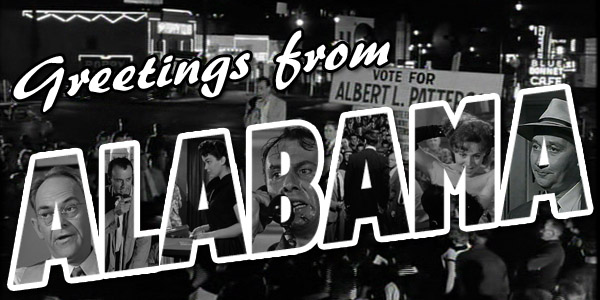
I’ve always wanted to travel across America. I’ve been a few times, to the major tourist attractions – Disneyworld in Florida, Vegas in Nevada, Cheers in Boston – but there’s so many places I’ve never seen in person, and most likely never will. Fortunately, there’s a solution, and it’s my own personal remedy to all life’s problems: movies. There’s been a movie set literally everywhere. Everywhere! So, this feature sees me cinematically visit a new state every week, through a film that was set there. You can read my journey so far here. Next up: Alabama!
Phenix City, Alabama, 1954. The city, just across the bridge from Georgia’s Fort Benning, has been at the mercy of mob rule for a hundred years. The town officials all turn a blind eye due to either being on the pay roll or fearing the consequences of standing up for themselves, with town attorney Albert Patterson (John McIntire) only getting involved for which ever side hires him in various disputes. A small band of townsfolk regularly picket and protest the syndicate, but have always proved ineffective. That is until Albert’s son and war hero John Patterson (Richard Kiley) returns home with his wife and children. Upon seeing the state of his home town, and witnessing the brutality of the mob’s men against those that dare oppose them, John sets about trying to clean the place up, but he can’t do anything without his father’s help.
On paper this sounds like a fairly standard one-man-brings-down-the-system thriller, except in this instance it’s based on a true story, and one which I’d never heard about before. Conveniently, all the key information is filled in for me during a 12-minute long documentary section at the beginning of the film, in which a reporter, Clete Roberts, explains the Phenix City situation, and interviews various people involved with the proceedings, some of whom will be glimpsed later on in the film playing themselves in tiny cameo roles, usually without any dialogue. In this intro we discover some of the key details regarding what we are about to see, namely that Albert Patterson eventually became Alabama’s Attorney General, but was assassinated by the mob, who are, at the time of the interviews, on trial for the murder and various other misdeeds, and some of the witnesses are being threatened. Fortunately, knowing this going into the film doesn’t spoil a great deal of the tension, as there’s far more story to tell, and it’s told remarkably well.
Considering this was released in 1955, there’s a surprising level of brutality, violence and morbid imagery, which is incredibly shocking the first time we see it. There’s a jarringly steep learning curve when the violence hits. Sure, the plot has been building up to some kind of action as John builds up his intentions against the mob, but when they opt to test his resolve, they do so in unprecedentedly brutal fashion. As in, fresh bloodied corpse of a young girl being thrown onto a lawn with a note tied to it. My notes at that point literally read “FUCK”. This is the moment when I realised this wasn’t going to be a standard noir. Everyone was at risk, anything could happen, and the Attorney General wasn’t going to be the only victim of these events.
Most of the criminal goings-on take place in the Poppy Club casino on 14th Street, a road seeping with gambling dens, loan sharks, prostitution and drugs, with the Poppy Club its pulsating, oozing heart. The club is run by Rhett Tanner (Edward Andrews), a terrifically slimy villain with a gang of henchmen at his disposal, and absolutely no morals. Reluctantly working for Rhett as a croupier is Ellie (Kathryn Grant), who is sweet on Fred Gage (Biff McGuire), the son of one of John’s protesters. Early on, Fred is seen to be on almost equal leading-man duties as John and Alfred, but he is taken out of the picture through various circumstances quite early on, intensifying the risk that any of these people could be in danger in some way. This makes the actions of the second half of the film, particularly a riot-heavy climax, almost unbearably tense. Those other two leads, McIntire and Kiley, are both excellent too, as indeed is pretty much the whole cast. McIntire walks the line of a respected, important man who has given up on trying to fix something that can’t be changed – in his own words, going up against the mob is like banging your head against a brick wall. The real star though is Kiley, whose face I can now match up against the voice of the jeep narrator in Jurassic Park. Beginning the film bright-eyed and hopeful, yet disappointed his town hasn’t improved in his absence, it’s not long before he is delivering rousing, blood-thirsty speeches to baying crowds, rallying the call and fighting the powers that be. There were several moments when I half-wanted to stand up and join along too, despite being sat on my sofa in my slippers.
I had some concerns early on that the opening documentary segment would remove most of the tension in the final act, and I was fully prepared to chastise the film accordingly, but in effect it worked extremely well. There’s enough set-up to catch you up on the situation, enough details are revealed to make you hooked and intrigued, yet there’s still plenty to come to keep you on the edge of your seat throughout. In short, I highly recommend this, especially if you’ve no knowledge of the situation and the events that took place in Phenix City in the 1950s.


